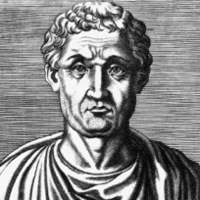The Consolation of Philosophy by Boethius: An Overview
Boethius ideas presented in "The Consolation of Philosophy" are influential. He translated both Plato and Aristotle into Latin. Plato, regarding poetry, influenced him. Like Plato, he says that there is an ancient quarrel between poetry and philosophy.

Anicius Manlius Severinus Boethius (480-524)
Accordingly, he finds poetry dangerous to society and people because it breeds sorrows and passions, which are poisonous to the development of rationality. Poetry makes one's mind diseased. It stirs uncontrolled emotions. He says, "… Muses of poetry… stifle the fruit bearing harvest of reason with the barren briars of the passions, they do not free the minds of men from disease but accustom them thereto" (115).
Like the church fathers, he found poetry useless from theological pursuits. But the reason he disliked poetry is related to the idea that poetry is related to pagan worship (Muse). This is anti- Christian idea too. In his The Consolation of Philosophy (book one) he forwards these ideas with a fair discrimination of poetry from philosophy.
But Boethius wants to heal the diseased mentality accustomed with poetry by the healing thought of philosophy. Philosophy, he thinks can heal the ill passions. He says "A way with you, sirens, deductive even to perdition and leave him to my Muses to be cared for the healed" (115). This is what the consolation of philosophy. When one gives oneself "in the lore of the Eleatics and Academics," (115) he/she can develop a rational principle in himself/herself, drifting away from passions.
To conclude, Boethius speaks on the line of Plato embrace wholly his conception of poetry as an instrument of breeding the germs of passion subordinating reason. Boethius, further, suggests the remedy of philosophical learning that can uphold one to develop reasoning faculty being free from passion. Since Boethius is Christian his attack for poetry is obviously because Muses of poetry are pagans. Therefore, his attack to poetry is malicious to paganism.
